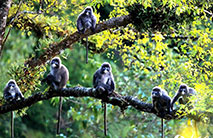Claim that Chinese researchers hid coronavirus data defies scientific ethics
BEIJING, July 22 (Xinhua) -- A U.S. researcher claiming that China hid coronavirus sequences to thwart the tracing of virus origin is against scientific ethics, a Chinese official said Thursday.
Last year, Chinese researchers published a research paper titled "Nanopore targeted sequencing for the accurate and comprehensive detection of coronavirus and other respiratory viruses" on the journal Small.
Jesse Bloom is a computational biologist and specialist in viral evolution at the Fred Hutchinson Cancer Research Center in Seattle. Last month, he said that the coronavirus sequences in the study had been removed from the Sequence Read Archive, an online database run by the U.S. National Institutes of Health (NIH), at the request of Chinese researchers.
Bloom said he was able to recover copies of the data stored on Google Cloud. "It therefore seems likely the sequences were deleted to obscure their existence " and "suggests a less than wholehearted effort to trace early spread of the epidemic," Bloom wrote in a preprint paper, not yet peer-reviewed by other scientists.
Speaking at a press conference on the novel coronavirus origin-tracing, Zeng Yixin, deputy head of the National Health Commission, said that China investigated the claim after it was reported.
The research paper is about a sequencing approach to help detect the coronavirus. According to Zeng, when the researchers submitted the paper last March, they needed to upload the sequencing results to prove their method.
On June 9, 2020, the journal sent the sample paper ready to be published to the researchers. They found that the uploading address where the sequencing data can be found was deleted during the review of the paper. Therefore, it was deemed unnecessary to keep their data in an NIH database. On June 16, 2020, the Chinese team emailed NIH to remove the data, and NIH removed the data at the request.
"The researcher has no need to hide or cover up and has no such subjective intention," Zeng said. Meanwhile, the researchers have uploaded the sequencing data, including 244 pieces of data from 61 samples, to the GSA database under China's National Genomics Data Center. The database is open to global users and anyone can make an inquiry.
Zeng added that the earliest sampling time of the virus samples is on Jan. 30, 2020, which has been some time since the beginning of the epidemic. The information and research value that these sample sequencing can provide is very limited in the coronavirus origin tracing.
Jesse Bloom did not get the confirmation from the Chinese researchers, did not understand the background of the data removal, and concocted the conspiracy theory claiming that it was a cover-up, Zeng said.
He noted that Bloom's conspiracy theory has a bad influence on international public opinion, slandered Chinese researchers and hurt them. "It is not only a departure from science but also a violation of scientific ethics."
During epidemics such as the COVID-19, the public pays attention to every word and action of scientists. Therefore, scientists should know their social responsibilities and not make arbitrary speculations, said Zeng, pointing out that Bloom's paper has been criticized by many scientists.
Photos
Related Stories
- New batch of China's Sinopharm COVID-19 vaccine arrives in Myanmar
- China calls on Portugal to jointly oppose "vaccine nationalism," "political virus"
- Sri Lanka receives another batch of Sinopharm COVID-19 vaccines from China
- China rejects WHO’s phase-2 COVID-19 origins study, calling it ‘lack of respect for common sense, arrogant toward science’
- When questioned on COVID-19 origin tracing, scientists have outright dismissed the Wuhan lab-leak conspiracy theory
Copyright © 2021 People's Daily Online. All Rights Reserved.










